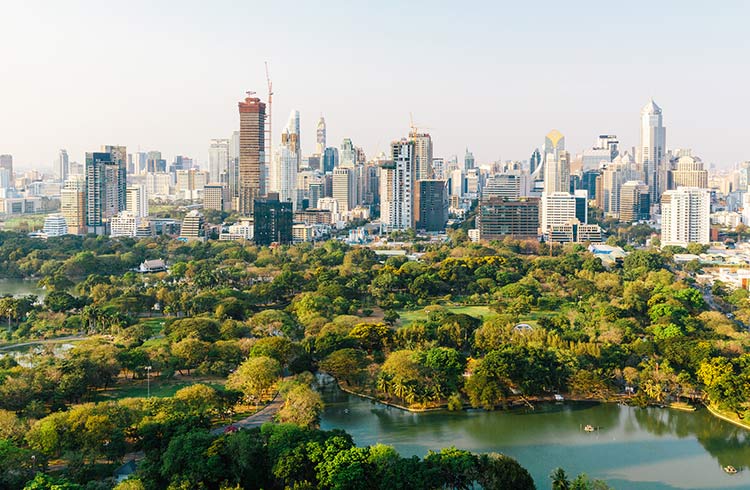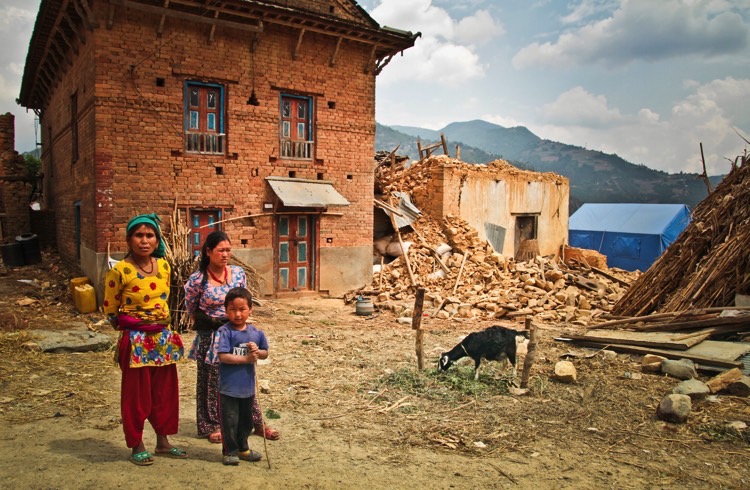How to Find Accommodation That is Green and Eco-Friendly
More of us want to 'sleep green' than ever before, but how can we be sure the hotels, hostels and resorts we choose are the real eco-deal?
 Photo © Getty Images / Alexander Spatari
Photo © Getty Images / Alexander Spatari
There’s one thing we all do when we travel, no matter who we are, where we’re going, or how we get there; we all need to find a place to sleep. And in these sustainably savvy times, "sleeping green" is the new black. Almost three-quarters (73 percent) of global travelers surveyed by Booking.com said they would choose eco-friendly accommodation at least once in the coming year and 70 percent said they were more likely to book accommodation if they knew it was eco-friendly.
And while luxury lodgings often get the attention – from InterContinental Hotels Group replacing tiny toiletries with bulk dispensers in 843,000 hotel rooms worldwide by 2021, to the soon-to-open Arctic Blue resort in Finland where room rates will be based on guests’ carbon emissions – the world is full of sustainable places to stay that don’t cost the earth.
- Finding eco-friendly accommodation
- Check its eco-credentials
- Think outside the eco-certified box
- Go small and communal
- Skip the greenwash cycle
- Green hotel checklist
Finding eco-friendly accommodation
It’s not as easy as you think. First, an inconvenient truth: popular booking sites such as Booking.com, Expedia and Trivago aren’t much help and won’t be until they add “green hotel” or “eco-friendly” as search filters (and make sure they mean something). Airbnb has no plans to include “eco-friendly” as a search filter but does allow you to type “eco” into the search bar and choose an accommodation type such as “cabin” or “earth house” to keep your footprint on the down-low.
You can, however, make your booking more eco-friendly with a site such as B’n’Tree, which plants a tree for every hotel booking made when you click through to a major booking site. If you’re heading to Europe, check out short-term rentals on Fairbnb, a social enterprise launching in 2020 in Venice, Barcelona, Bologna, Valencia, Amsterdam and Genoa. It donates half its income to local environmental (and social) projects, such as community gardens and food waste recovery centers.
Check its eco-credentials
Booking an eco-hotel (for simplicity, let’s use ‘hotel’ for all kinds of accommodation) would be a whole lot simpler if there were one certification scheme to rule the world. Instead, there are more than 400, some more reputable than others.
“You can’t manage what you can’t measure,” says Stewart Moore, founder and CEO of EarthCheck, which pioneered eco-certification for the tourism industry in 1998. “It is now 28 years since the Rio Earth Summit, the first global call to arms on the need for sustainable development, and the tourism industry is still running around with tick-box schemes that give you a green star.”
To be worthy of the name, eco-certification must at the very least be “performance-based, verified by independent parties and holistic, covering all aspects of a hotel’s operation including social responsibility,” says Moore.
Another established eco-label for the travel industry is Green Key, run by a Copenhagen-based NGO, which has certified accommodation providers, tourist attractions and restaurants in 66 countries and, like EarthCheck, has a handy searchable map on its website to help you find them. Then there’s Green Globe, a membership-based organization that operates in 40 countries and has a website you can search by region and type of accommodation (hotels and resorts, urban, beach, etc.). Down under, Ecotourism Australia has an online Green Travel Guide listing eco-certified hotels, resorts and lodges across Australia.
Think outside the eco-certified box
Keep in mind, however, that certification is often so expensive and time-consuming it can exclude smaller hotels that may be just as eco-worthy. In these cases, look for a sustainability section on their websites, which should mention specific actions such as offering guests filtered water in glass instead of plastic bottles, composting food waste or using 100 percent renewables.
There are other signs a hotel has its heart in a sustainable place. It might mention the 17 UN Sustainable Development Goals, which include green goals such as “sustainable cities” and “climate action”. If the hotel is a certified B Corp, committed to purpose as well as profit, you’ll find it using the online B Corp Directory. Similarly, you can find members of 1% for the Planet on its interactive map; or look for the 1% logo on a hotel’s website, which means that it donates 1 percent of its sales to accredited environmental organizations.
You can also try searching for hotels that have won World Responsible Tourism Awards or made it onto lists published by sustainable travel experts; Feynan Ecolodge in Jordan, for example, has won numerous sustainability awards and is regularly voted one of the world’s top eco-lodges.
Go small and communal
Some types of accommodation are naturally eco, without needing to be certified. Tiny house stays, cabins, wilderness huts, and glamping set-ups, for instance, all have small, often temporary, footprints.
Backpacker hostels such as The Yard Hostel in Bangkok, which is built from recycled shipping containers, also tend to have built-in eco-ethos, given that guests share rooms (reducing each traveler’s impact) and use communal kitchens and living areas. Hostelling International in particular, along with its national hostel organizations, has long had a sustainable streak; YHA Australia’s website, for instance, specifically lists ‘sustainable hostels’ all over Australia.
House-swapping is another low-cost environmentally friendly option. “Instead of continually building new hotel skyscrapers to accommodate already overcrowded tourist areas and further destroying natural habitats, home exchange provides a platform for continued tourism with less environmental impact,” says Alexandra Scarpino, Australia and New Zealand country manager for the global house-swapping website Home Exchange, which lists more than 400,000 properties worldwide.
Skip the greenwash cycle
Asking guests to hang up their towels and to choose not to have their bed linen changed daily is no longer enough to deserve eco credentials. Banning single-use plastics seems to be heading that way too; it’s a quick fix, makes the hotel look green and is high in emotional engagement – nobody likes seeing plastic on beaches or harming sea birds and turtles – but it doesn’t say much about the hotel’s real environmental impact.
So, how do we avoid being duped by so-called "greenwashing"? Read about genuinely eco-friendly hotels and “best practices” so you can tell whether a hotel’s commitment to sustainability is superficial or serious. Check out the hotel’s website, as mentioned above. And be observant when you check-in. Are there ceiling fans and opening windows instead of air-conditioning? If there is aircon, does it switch off automatically when you leave the room? The more eco-friendly places you stay in, the more you’ll know what to look for – and the more you can give constructive feedback when you check out, to help hotels lift their game.
Green hotel checklist
It can be handy to have a checklist you can refer to when booking accommodation. Customize it to what matters to you – is plastic pollution more important to you than energy efficiency? – and it’ll be even more effective in helping you align your values with your travel plans.
And don’t be afraid to contact the hotel directly to ask about sustainability. The more we all do this, the more we normalize sustainable practices and the better off the planet will be. Here are 10 suggestions to get you started:
- Sustainably built: small footprint, passive-solar design to reduce energy use, locally sourced eco-friendly materials
- Carbon-neutral: offsets guests' stays by, say, planting trees
- Car-free: bikes to use, free shuttles to town, public transport options
- Close to nature: low-impact, nature-based activities on offer (no jet skis!)
- Plastic-free: toiletries in bulk dispensers and no single-use plastic
- Wildlife friendly: funds conservation or habitat restoration
- Zero-waste: committed to reducing all waste, including food waste
- Energy-wise: powered by renewable energy and reduces energy use
- Plant-based: vegetarian or vegan options to reduce meat consumption
- Zero-miles: seasonal, local, organic and/or sustainably sourced food.
Related articles
Simple and flexible travel insurance
You can buy at home or while traveling, and claim online from anywhere in the world. With 150+ adventure activities covered and 24/7 emergency assistance.
Get a quote


No Comments